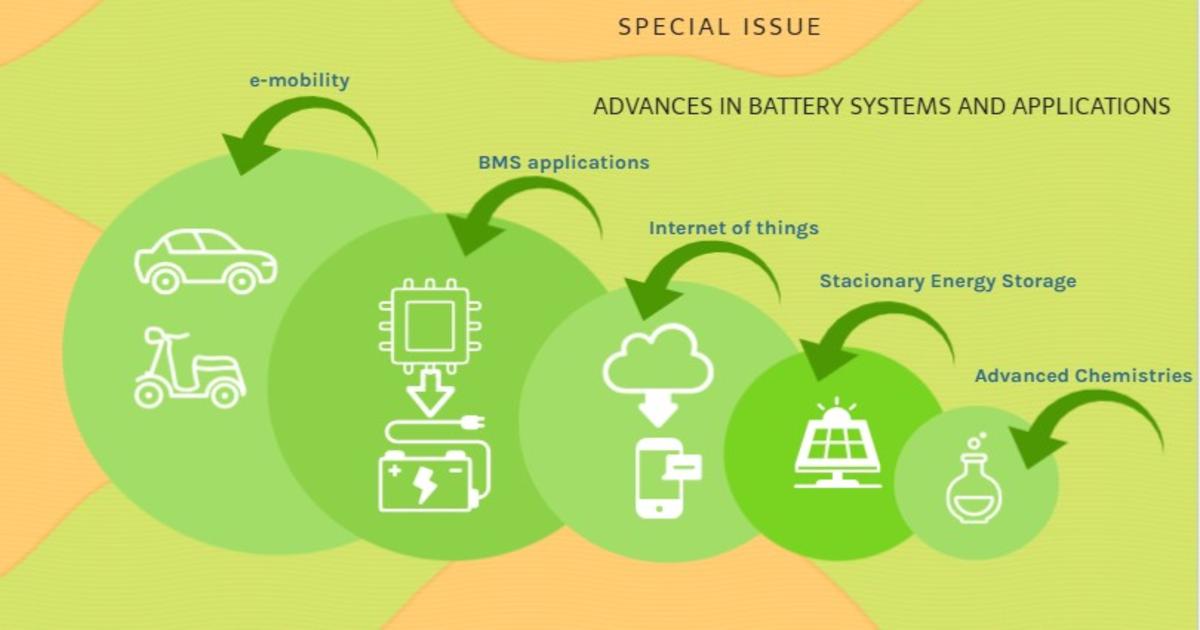Advances in Battery Systems and Applications
A special issue of Batteries (ISSN 2313-0105). This special issue belongs to the section "Battery Modelling, Simulation, Management and Application".
Deadline for manuscript submissions: closed (28 October 2022) | Viewed by 5469

Special Issue Editors
Interests: battery modeling; electronic instrumentation systems; Internet of Things (IoT)
Special Issues, Collections and Topics in MDPI journals
Interests: lithium-ion battery testing and characterization; lithium-ion battery degradation mechanisms via non-invasive methods; incremental capacity and peak area analyses; mechanistic battery modeling; battery lithium plating; battery fast charging; battery diagnosis and prognosis; battery state of charge and state of health determination methods
Special Issues, Collections and Topics in MDPI journals
Special Issue Information
Dear Colleagues,
Advanced rechargeable batteries are crucial for an industrial and social evolution toward a sustainable society. Among battery technologies, lithium-based batteries have seen tremendous growth in recent years, but further technological advancements are expected for emerging battery applications such as the Internet of Things, electric mobility, and stationary energy storage. This Special Issue invites articles on innovative developments for “Battery Systems and Applications” with a special emphasis on emerging battery systems and applications that improve performance, safety, and environmental sustainability.
Potential topics include but are not limited to the following:
- Integration of battery cells into a battery system, including mechanical, electrical, and thermal aspects;
- Adaptation of battery system design to novel cell chemistries (advanced lithium-ion, solid-state cells);
- Applications for lithium batteries, including portable applications, e-mobility (EV), stationary (energy storage technology), satellites/aerospace applications;
- Battery applications in the field of Internet of Things (IoT): wearable battery solutions, medical, industrial, smart home, energy storage, etc.;
- Design, control, and optimization of battery management systems (BMS);
- Cell, module, and system-level performance monitoring;
- Innovative charge/discharge management systems.
Prof. Dr. Juan Carlos Álvarez Antón
Dr. David Anseán
Guest Editors
Manuscript Submission Information
Manuscripts should be submitted online at www.mdpi.com by registering and logging in to this website. Once you are registered, click here to go to the submission form. Manuscripts can be submitted until the deadline. All submissions that pass pre-check are peer-reviewed. Accepted papers will be published continuously in the journal (as soon as accepted) and will be listed together on the special issue website. Research articles, review articles as well as short communications are invited. For planned papers, a title and short abstract (about 100 words) can be sent to the Editorial Office for announcement on this website.
Submitted manuscripts should not have been published previously, nor be under consideration for publication elsewhere (except conference proceedings papers). All manuscripts are thoroughly refereed through a single-blind peer-review process. A guide for authors and other relevant information for submission of manuscripts is available on the Instructions for Authors page. Batteries is an international peer-reviewed open access monthly journal published by MDPI.
Please visit the Instructions for Authors page before submitting a manuscript. The Article Processing Charge (APC) for publication in this open access journal is 2700 CHF (Swiss Francs). Submitted papers should be well formatted and use good English. Authors may use MDPI's English editing service prior to publication or during author revisions.
Keywords
- Li-ion batteries
- emerging battery applications
- Internet of Things
- battery management system (BMS)
- integration of battery systems






